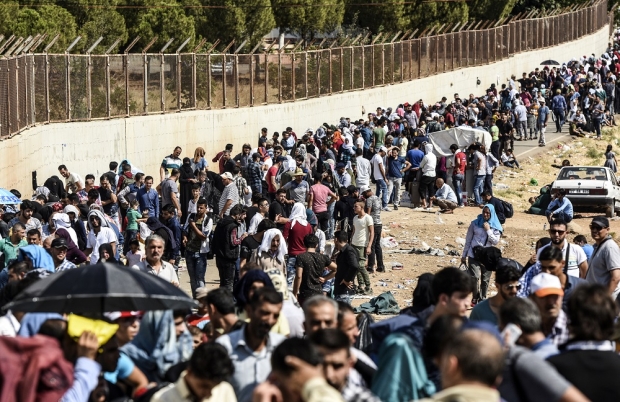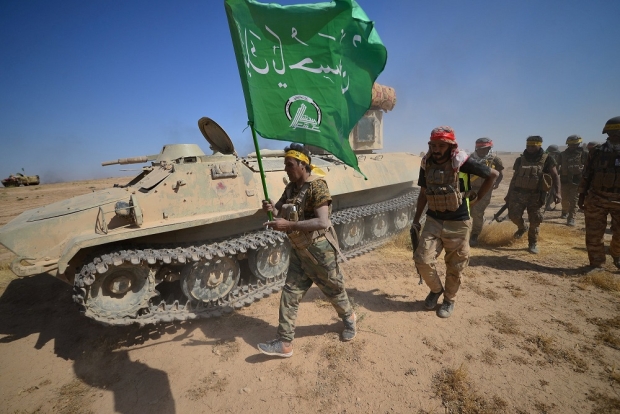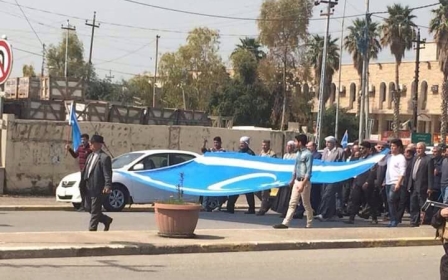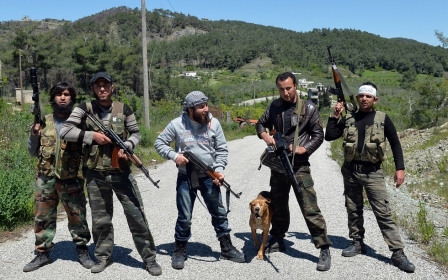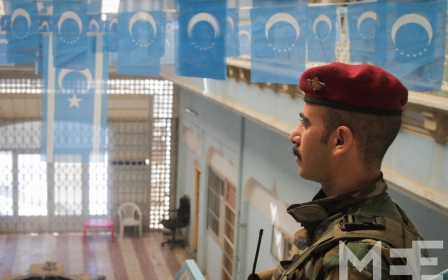Iraq's Turkmen, the refugees created and forgotten by everyone

ISTANBUL, Turkey – Some days Omer Mejid stacks supermarket shelves. On others, he labours at construction sites. On the worst of days, he sits by idly unable to find work, worrying about how to sustain his family.
For someone who saw his brother killed by militants from the Islamic State (IS) group, this sort of hardship, however, is mere detail.
"I am alive. I am safe. The rest is not so important," the 24-year-old father of three, resigned to his lot in life, told Middle East Eye.
The extended Mejid family fled their hometown of Mosul in 2014 after IS forces captured the city.
They are part of an estimated 75,000 Iraqi Turkmen who have fled to Turkey in the years after Mosul and Tal Afar in Iraq fell to IS.
Ten of them now live in a 90sq/m flat in the central Anatolian town of Cankiri. The family's eldest son, Mohammed, at 28, has five dependants of his own and lives in a nearby flat of the same size.
Neither classified as "guests" like the nearly three million Syrian refugees in Turkey, nor migrants like Afghans and others transiting through to Europe, the Turkmen from Mosul and Tal Afar find themselves caught in limbo somewhere in between.
With no desire to travel to Europe either, their plight has attracted little attention in the West.
Any preferential treatment they expected in Turkey due to their ethnic kinship, or for often being cited as part of the Turkish government's reason for concern over the fate of Iraq, has not been forthcoming.
Speaking the language has helped - but has also meant most aid organisations see them as less vulnerable.
The Mejids first went to Baghdad in 2014 - and after not finding the sense of security they sought, found their way to Turkey illegally by paying smugglers $300 a family member.
They are left with nothing by the time they reach the border
- Mehmet Tutuncu, Iraqi Turks cultural and assistance association
Mehmet Tutuncu, the president of the Iraqi Turks cultural and assistance association, an NGO established by Turkmens in 1959, told MEE that most Turkmen from Mosul and Tal Afar had to travel a far more precarious route via Syria to get into Turkey.
"They usually have to bribe their way through territory controlled by the Kurdish PYD, Daesh and Nusra to get to the border crossing near Turkey's Kilis," said Tutuncu.
"They are left with nothing by the time they reach the border."
According to Tutuncu, any assistance for Turkmens comes from private citizens and NGOs, but not directly from the government.
"Right now we have 1,000 Turkmens stuck in Azaz across the border. We are trying to get them in but Turkey won't allow it," he said.
"The Turkish government is only willing to provide them with aid in the camp on the other side of the border."
Tutuncu also pointed to increased hardships within Turkey. He said one-year residence permits for humanitarian reasons were scrapped a few months ago, and the Turkmen were told to apply to the UN instead.
Mohammed, Omer's brother, told MEE being pushed into the hands of the UN made finding work even harder.
"People are good to us because of our shared ethnic bonds. Our neighbours help with food supplies and are very kind," said Mohammed.
"But people are scared to employ us because we have no Turkish ID. Those that do pay us much less, thinking we get an income from the UN."
Many of the locals, touched by the living conditions of the refugees, do what they can to help.
Mehmet, the owner of a roadside restaurant on the Ankara-Cankiri highway, employs Firas, Omer's 19-year-old brother, to clean in return for 20 lira a day, about $5, plus meals and commuting fare.
"Of course I would like to pay more. But I am fully staffed and only employed him because of their condition," said Mehmet.
"I cannot afford to pay him more although he is a very good boy."
Kindness of strangers
Appreciative of the kindness shown by people, the Mejids still yearn for a return home and for dignity.
"We were never wealthy in Mosul. But we also didn't need to depend on the charity of others," said Omer.
"I worked as a driver and earned enough to care for my family. My father is an engineer and was respected in the community.
"Don't get me wrong - the people here are really good to us but it is just not the same."
Omer said a return home, however, was not an option for now.
We were never wealthy in Mosul. But we also didn't need to depend on the charity of others
- Omer Mejid, Turkmen refugee
"I speak to my sister who stayed behind with her husband. She tells me there is nothing to return to in Mosul," he said.
"The city is devastated, no jobs, no security - nothing."
Tutuncu said the Turkmen of Iraq had become accustomed to living in fear and on the run. He said his association alone had helped more than 60,000 Iraqi Turkmen since it was established.
"The most recent wave of trouble started after the no-fly zone of the first Gulf war in 1991," he said.
"The Turkmen were targeted by Kurdish Peshmerga forces looking to usurp our lands and drive us out despite their own infighting.
"The targeting by the Peshmerga got worse after 2004. Now it is Daesh."
He said the Iraqi Turkmen considered Shia elements of the Iraqi central government's Popular Mobilisation Units as less of a threat compared with the other two.
"The Iraqi Turkmen don't really have any problem along Shia-Sunni lines among themselves.
"If anything it is more of a tribal issue where innocent people get caught up in violence because of positions tribal leaders take."
Tutuncu added that 20-25 percent of Iraqi Turkmen sheltering in Turkey were Shia.
Echoing the feelings of being under constant siege, Mohammed said he did not remember a day in his 28 years when Iraq was not at war and without hardship.
"Since 1980, Iraq has been at war with Iran, Kuwait, the Americans, Daesh, and this and that group. We, the poor people, have been the ones to suffer," said Mohammed.
"But no country has ever stepped in and said 'listen, here is some real help'.
"As Turkmens we are the worst off. In Iraq, the Arabs and the Kurds always come first.
"In Turkey, we are ignored and left to fend for ourselves. All we want is to be left in peace in our own towns and villages."
New MEE newsletter: Jerusalem Dispatch
Sign up to get the latest insights and analysis on Israel-Palestine, alongside Turkey Unpacked and other MEE newsletters
Middle East Eye delivers independent and unrivalled coverage and analysis of the Middle East, North Africa and beyond. To learn more about republishing this content and the associated fees, please fill out this form. More about MEE can be found here.



